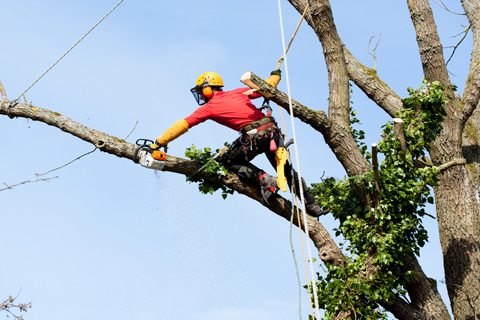
Your trees are constantly responding to environmental changes and throughout the year, they will need some help by way of pruning.
Tree pruning will help to improve the overall health of your trees, their overall appearance, and naturally reduces the possibility of tree failure. The improper pruning of a tree can stress a tree leading to potential decay, infestation, disease, and even death.
Below the arborist at 72 Tree, Seed & Land Co. discuss the different ways trees can be properly pruned.
When reducing the height of a tree, much care and precision pruning are necessary.
This procedure must be done correctly; “topping” or cutting through the main trunk often leads to several issues for the tree including failure.
Depending on the species and growth pattern of the tree, height reduction may not be possible without irreparably damaging the tree. In these cases, the choice to remove or relocate it may have to be made.
Crown raising involves the pruning, cutting, or removal of the lowest branches of a tree. This procedure provides more clearance under a tree for people and vehicles.
This procedure, when performed on younger trees, will encourage more growth in the upper branches. When raising the crown on older more developed trees, much caution is needed as the lower branches will be much larger and leave larger wounds.
Crown thinning is a wise option for trees that sustain the full force of strong winds or have to bear the weight of accumulated snow or ice.
This is accomplished by the selective and careful removal of branches from within the crown. This process reduces the force of the wind on the canopy, as well as reducing the weight of snow and ice on the tree.
Care must be taken when thinning a crown. The improper procedure or over thinning can lead to disease, decay, infestation, or make the tree more susceptible to being blown over.
As the name suggests, crown cleaning is the removal of dead and dying branches. Crown cleaning is the more common of the pruning options.
This procedure helps to protect your tree by removing unnecessary weight, reduces the risk and hazard of falling branches, helps to halt the progression of decay and disease, thus improving the overall health of the tree.
Small or ornamental trees should be routinely pruned for many of the same reasons mentioned above. They may also be pruned for simple esthetics or to train them as they grow.
Once aware of the signs your tree needs pruning, having your trees regularly pruned by a tree service or certified arborist will keep your trees healthy and beautiful. This will also benefit your landscape by the early detection of problematic infestations, fungi, or irregularities that may otherwise go unnoticed until it’s too late to correct.
An added benefit to regular pruning services is curb appeal. The better your landscape appears, the more curb appeal your property will have. This usually translates to a higher property value.
Overall, pruning is beneficial and necessary throughout the year. Follow these tree pruning tips, and visit our tree care blog more articles and information.